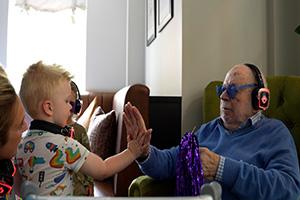Loneliness Awareness Week: Reducing social isolation in care homes
Over one million older people report feeling lonely all the time1, and even when living in a care home, loneliness and isolation can still occur.
According to Christina R Victor’s ‘Loneliness in care homes: a neglected area of research?’ thesis, rates of severe loneliness reported by people living in care homes (22-42%) are more than twice that of residents in the wider community (10%).
It’s important that care home operators are aware of what can be done to support their residents and staff, and reduce the risks of isolation and loneliness. For this year’s Loneliness Awareness Week (14-18 June), Bernadette Mossman, Healthcare Director at dementia care specialist Vida Healthcare, discusses how care home operators can combat feelings of loneliness and promote good wellbeing.
 Residents
Residents
The main role of a care home is to provide high quality care to its residents, and create a positive living environment which promotes good wellbeing. To reduce feelings of isolation and loneliness, care home operators can:
Improve connectivity with staff:
Care home staff play a huge part in easing feelings of loneliness, particularly when visits from friends and family are prohibited. Initiatives, such as cutting edge technology, can free up staff time so that they have more opportunities to socialise with residents.
Invest in social activities:
Consider coordinating different activities, such as stretching classes and choirs, to encourage residents to socialise with each other and therefore create a community spirit and strong connections.
Keep families connected:
Moving to a care home can be a stressful time, particularly when it comes to being able to see friends and family regularly. Visiting policies and times which are accessible will keep residents feeling connected to their community, and families up-to-date with the lives of their relatives.
Staff
It’s not only residents that can feel lonely in care homes. Care home operators also have a duty of care to protect their staff and promote positive mental wellbeing.
Open communication:
A positive workplace environment where conversations between colleagues are encouraged will support their mental health. If an employee is feeling lonely or struggling with their work, make it clear that it’s ok for them to talk to someone about how they feel. This is often an effective way of helping people to cope, and can address an issue before it becomes severe.
Work life balance:
A good work life balance is crucial for staff to be able to spend time with their friends and family, and therefore reduce feelings of isolation and loneliness. It’ll also make care provision more effective because burnout will be less likely, and their mental health will be optimal.
Socialisation with families:
Families are not only crucial to support the mental health of residents, but can also provide another outlet for staff. Good connection between staff and families will promote feelings of positivity and give both parties opportunities to create a positive environment for all involved.
Care home operators which consider methods of combating loneliness, opening up lines of communication between key stakeholders, and encouraging connectivity will find that their residents live longer, healthier and happier lives, and staff recruitment and retention rates improve.
For more information, please visit www.vidahealthcare.co.uk





